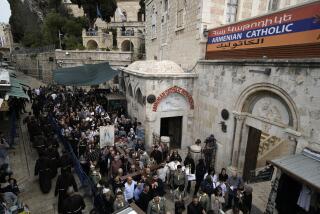Peace Prevails in Iraq as Shiites Observe Holy Day
- Share via
BAGHDAD — For the first time since the March 2003 U.S.-led invasion, hundreds of thousands of Iraqi Shiites on Thursday marked their most important religious holiday without suffering a terrorist attack.
Waving red, green and yellow flags and some beating themselves with chains, members of Iraq’s majority Shiite community gathered around major shrines for Ashura, which commemorates the martyrdom of Imam Hussein, grandson of the prophet Muhammad. As many as 2 million Shiite pilgrims from Iraq and abroad crowded the city of Karbala, where Hussein is buried, security officials reported.
Suicide bombers killed 180 people in 2004, and 50 people last year, despite heightened security. Observation of the holiday was suppressed under Saddam Hussein, a Sunni Muslim.
A U.S. military official attributed the relatively peaceful proceedings to better-trained Iraqi security forces; Sunni Arab leaders said insurgents refrained from attacks for fear of sabotaging negotiations for power-sharing in the new government. Sunni Arabs won a combined 55 parliamentary seats in the Dec. 15 elections, whereas the Shiite-dominated United Iraqi Alliance captured 128 of the 275 seats.
Pilgrims marched carrying gold-domed replicas of the shrines, beating drums and chanting slogans in memory of Hussein. He was killed in the 7th century on the plains near Karbala by the Caliph Yazid in a succession battle that split Muslims into the Sunni and Shiite sects.
“By God, we will never forget you, Hussein!” the pilgrims chanted, as they swarmed the streets surrounding the shrines in Karbala, Najaf and Baghdad.
Pilgrims walked for days to Karbala, eating rice and taking shelter in tents set up along the route by well-wishers. Costumed men on horseback staged elaborate reenactments of Hussein’s martyrdom in passion plays called taziyas. Fervent mourners beat themselves, some striking their heads with swords and drawing blood.
“Hussein is a symbol for us,” said Mohammed Mehdi Rubayie, 33, a restaurant worker in the northern Baghdad suburb of Kadhimiya, home of an important Shiite shrine. “He fought for our religion, and he fought against oppression.”
The Shiite-led government kept electricity on 24 hours a day in Najaf and Karbala for pilgrims, who arrived from Iran, Pakistan and Afghanistan as well as other parts of Iraq. One pilgrim was reported killed Thursday afternoon in a shooting in western Baghdad.
A suicide bombing last month in Karbala killed dozens, raising sectarian tensions and hurting the bargaining position of the minority Sunni Arabs, who lead the insurgency. A Sunni tribal leader said rebels had agreed to halt attacks during Ashura.
“The activities of the resistance are at a halt now until we have a unity government,” Osama Jadan, a leader of a western Iraqi tribe, said. “That’s the information we have from the resistance.”
U.S. officials said improved Iraqi security forces played a role in diminishing violence. U.S. and Iraqi forces raided a village southeast of Baghdad this week where insurgents were allegedly preparing to attack Ashura pilgrims. A spokesman for the border police in Najaf said his men caught a Turkish national who reportedly confessed that he and other foreigners were trying to sneak into Iraq to stage attacks during Ashura.
In Baghdad, U.S. military spokesman Army Maj. Gen. Rick Lynch said the experiences of 2004 and 2005 had taught Iraqi forces to impose vehicle bans and establish multiple security cordons around shrines in Karbala, Najaf and Kadhimiya.
“You think like the enemy,” Lynch told reporters when asked about the relative calm this year. “The Iraqi government did detailed planning and preparation for Ashura.” Still, he acknowledged that the number of insurgent attacks nationwide had not declined precipitously.
U.S. officials announced Thursday that a suicide bomber had killed two Iraqi soldiers and three civilians Wednesday at a joint U.S.-Iraqi checkpoint near the village of New Ubaidi.
In the northern city of Kirkuk, tensions rose over the killing Tuesday of several civilians by contract security guards stationed at a U.S. army base. American and Iraqi officials said they were conducting a joint investigation into the deaths.
The guards, working for the State Department, opened fire from two GMC sport utility vehicles, killing two Kurdish men in separate cars and wounding a third at a traffic circle north of Kirkuk, said Maj. Gen. Shirko Shakir, the city’s police chief.
The number and nationality of the guards involved and the name of their company were not disclosed. Lt. Col. James Johnson, commander of the 2nd Battalion, 327th Infantry Regiment, said the guards were “under our control” while the investigation proceeded. In a written statement, he called the shooting “regrettable.” The regiment is part of the Army’s 101st Airborne Division, which is responsible for security in Kirkuk.
Angry relatives buried the two men and demanded that the killers be punished. Several Iraqi politicians demanded abolition of a law that grants immunity from prosecution to American and allied forces and private contractors working for them.
“There was nothing going on at the time of the shooting that could justify it,” said Imad Hameed Ibrahim, whose uncle, Nizam Qadir, 25, was killed at the wheel of his taxi. “These foreigners do not care about the lives of Iraqis.”
Special correspondents in Najaf and Kirkuk contributed to this report.
More to Read
Sign up for Essential California
The most important California stories and recommendations in your inbox every morning.
You may occasionally receive promotional content from the Los Angeles Times.













